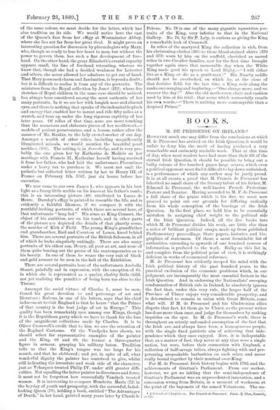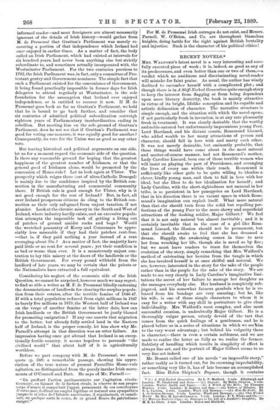BOOKS.
M. DE PRESSENa ON IRELAND.*
HOWEVER much one may differ from the conclusions at which M. de Pressense has arrived on the Irish Question, it would be unfair to deny him the merit of having produced a very remarkable and eminently readable work. That at this time of day, when most readers have had more than their fill of the eternal Irish Question, it should be possible to bring out a bulky volume of five hundred pages large octavo, which even a political opponent must find it difficult to lay down unfinished, is a performance of which any author may be justly proud. It is, at all events, a proof that M. Francis de Pressens6 has inherited no small share of the literary talent of his father, M. Edmond de Pressense, the well-known French Protestant Pasteur and Senator. Having accorded to M. F. de Pressense a full share of the praise which is his due, we must now proceed to point out our grounds for differing radically from his whole conception of the bearings of the Irish
Question. In the first place, we hold him to be essentially mistaken in assigning chief weight to the political side of the Irish Question. Indeed, all the five books into which M. de Pressense divides his work, are little else than a series of brilliant political essays, made up from published Parliamentary proceedings, State papers, histories, and bio- graphies of statesmen. Of these, a most formidable list of authorities, extending to upwards of one hundred sources of information, is prefaced to the work. Bulky as this list is, and complete from the political point of view, it is strikingly deficient in works of economical reference.
M. de Pressense has evidently steeped his mind with the Irish political history of the past hundred years, to the practical exclusion of the economic problems which, in our judgment, are incomparably the most essential factors in the Irish Question. And in endorsing the Nationalists' sweeping condemnation of British rule in Ireland, he absolutely ignores the fact that, under this very rule, the larger half of the Province of Ulster enjoys very considerable prosperity, and is determined to remain in union with Great Britain, come what will. If M. de Pressens6 and his Gladstonian allies dispute that fact, let them go to Ulster, as the present writer has done more than once, and judge for themselves by making inquiries on the spot. In M. de Pressense's work, there is throughout an utterly unfounded assumption of the fact that the Irish are, and always have been, a homogeneous people, with the single fixed patriotic aim of achieving that inde- pendence which they once enjoyed. Now, it is indisputable that, as a matter of fact, they never at any time were a single nation, but were, before their connection with England, a collection of half-savage tribes, always fighting with and per- petrating unspeakable barbarities on each other, and never really bound together by their nominal over-King.
For M. de Pressense, Irish history begins with 1782, and the achievements of Grattan's Parliament. From our author, however, we get no inkling that the semi-independence of Grattan's Parliament was an unprecedented innovation, and a concession wrung from Britain, in a moment of weakness, at the point of the bayonets of the armed Volunteers. The un-
• larlande et l'Angleterre. Par Francis do Pressens6. Paris : E. Pion, Nourrit. et Cie.
informed reader—and most foreigners are almost neoessarily ignorant of the details of Irish history—would gather from M. de Pressense that Grattan's Parliament was merely re- covering a portion of that independence which Ireland had once enjoyed in earlier times. As a matter of fact, the body called an Irish Parliament, which had existed at intervals for six hundred years, had never been anything else but strictly subordinate to, and sometimes actually incorporated with, the Westminster Parliament. For the two centuries previous to 1782, the Irish Parliament was, in fact, only a committee of Pro- testant gentry and Government nominees. The simple fact that such a Parliament existed for the convenience of Government, it being found practically impossible in former days for Irish delegates to attend regularly at Westminster, is the sole foundation for the assumption that Ireland ever enjoyed independence, or is entitled to recover it now. If M. de Pressense goes back as far as Grattan's Parliament, we hold that he is bound to go back further, and consider that six centuries of admitted political subordination outweigh eighteen years of Parliamentary insubordination ending in rebellion. But meeting him on the sole ground of Grattan's Parliament, does he not see that if Grattan's Parliament was good for voting one measure, it was equally good for another?
Consequently, its vote for the Union was as good as any other vote.
But leaving historical and political arguments on one side, let us for a moment regard the economic side of the question. Is there any reasonable ground for hoping that the greatest happiness of the greatest number of Irishmen, or that the general good of Irishmen alone, would be promoted by the concession of Home-rule ? Let us look again at Ulster. The prosperity which reigns there (out of ultra-Catholic Donegal) is mainly due to the confidence inspired by the British con- nection in the manufacturing and commercial community there. If British rule is good enough for Ulster, why is it not good enough for the rest of Ireland ? But, in fact, all over Ireland prosperous citizens do cling to the British con- nection as their only safeguard from unjust taxation, if not plunder. Look at the chronic misery in the South and West of Ireland, where industry hardly exists, and an excessive popula- tion attempts the impossible task of getting a living out of patches of ground amidst rocks and bogs ? Would the wretched peasantry of Kerry and Connemara be appre- ciably less miserable if they had their patches rent-free, —that is, if they paid nothing a year instead of a rent averaging about 30s. ? As a matter of fact, the majority have paid little or no rent for several years ; yet their condition is as bad or worse than ever. It is a monstrously unjust con- tention to lay this misery at the doors of the landlords or the British Government. For every pound withheld from the landlord of late years, we may be certain that the priests or the Nationalists have extracted a full equivalent.
Considering his neglect of the economic side of the Irish Question, we cannot be surprised, however much we may regret, to find so able a writer as M. F. de Pressense blindly endorsing the denunciations of landlords for clearing the surplus popula- tion from their estates, after the terrible famine of 1846-47.
If with a total population reduced from eight millions in 1847 to barely five millions in 1879, the Western half of Ireland was
on the verge of another famine at the latter date, how can Irish landlords or the British Government be justly blamed for promoting emigration ? If any one asserts that migration to the better, but already fully settled land in the Eastern half of Ireland, is the proper remedy, let him show why Mr. Parnell's attempt in that direction was an utter failure. An impression having once got abroad that Ireland is an excep- tionally fertile country, it seems hopeless to persuade "the civilised world" that about half of it is agriculturally worthless.
Before we part company with M. de Pressense, we must quote (p. 348) a remarkable passage, showing his appre- ciation of the true nature of present Parnellite Home-rule agitation, as distinguished from the purely insular Irish move- ments of O'Connell and Batt. He says of Mr. Parnell
"En greffant l'action parliamentaire sur l'agitation revolu- tionnaire, en faisant de la faction rivals, la reserve de son propre corps d'armee it conquerait l'appui permanent de ces concitoyens d'outre mer, it offrait nn emploi legitime et naturel aux sympathies jusque-lil st6riles de 'Irian& americaine, it regularisait, et canali-
salt, en quelque sorte le cours, de ce grand fieuve du patriotisme émigré."
For M. de Pressense Irish outrages do not exist, and Messrs. Parnell, W. O'Brien, and Co. are throughout blameless knights, doing battle for the right against British brutality and injustice. Such is the character of his political ethics !



































 Previous page
Previous page